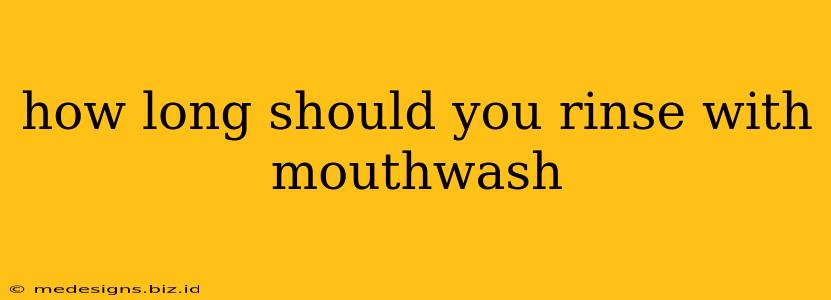Many of us incorporate mouthwash into our daily oral hygiene routine. But are we using it correctly? Knowing how long to rinse with mouthwash is crucial for maximizing its benefits and avoiding potential harm. This comprehensive guide will clarify the ideal rinsing time and address frequently asked questions.
The Recommended Rinse Time: 30 Seconds is Key
The general consensus among dentists is to rinse with mouthwash for approximately 30 seconds. This allows sufficient time for the active ingredients to work their magic, effectively targeting bacteria and freshening your breath. Anything less might not provide full benefits, while rinsing for much longer could lead to some negative consequences.
Why 30 Seconds?
This timeframe is carefully considered:
- Sufficient Contact Time: 30 seconds ensures adequate contact between the mouthwash and your teeth and gums, enabling the active ingredients (like fluoride or antimicrobial agents) to work effectively.
- Avoiding Irritation: Extended rinsing can irritate the delicate tissues in your mouth, potentially leading to dryness, burning sensations, or even damage to the enamel over time.
- Optimal Efficacy: The formulation of most mouthwashes is designed to be most effective within a 30-second timeframe. Prolonged rinsing doesn't necessarily translate to improved results.
Different Mouthwashes, Different Considerations?
While 30 seconds is a good rule of thumb, some mouthwashes might have specific instructions on their packaging. Always carefully read the label of your chosen mouthwash. Some therapeutic mouthwashes designed for specific conditions, such as gingivitis, may require different rinsing times.
What Happens If You Rinse for Too Long?
Rinsing with mouthwash for an extended period (longer than a minute) can lead to several issues:
- Dry Mouth: Mouthwash can strip away natural moisture, leading to discomfort and an increased risk of cavities.
- Taste Alterations: Prolonged exposure might alter your perception of taste.
- Enamel Erosion: Some mouthwashes, especially those with high alcohol content, can erode tooth enamel with excessive use.
- Oral Irritation: Extended rinsing can cause burning, soreness, or other forms of irritation in the mouth and gums.
What Happens If You Rinse for Too Short a Time?
Conversely, rinsing for too short a time might not provide the intended benefits. You may not achieve sufficient antibacterial action or fluoride protection.
Beyond the Rinse: A Complete Oral Hygiene Routine
Remember, mouthwash is a supplementary tool, not a replacement for proper brushing and flossing. A complete oral hygiene routine includes:
- Brushing: Brush your teeth twice a day for at least two minutes each time, using fluoride toothpaste.
- Flossing: Floss daily to remove plaque and food particles from between your teeth.
- Mouthwash: Use mouthwash as directed, usually once or twice a day after brushing.
- Regular Dental Checkups: Schedule regular checkups and cleanings with your dentist to maintain optimal oral health.
Frequently Asked Questions (FAQs)
Q: Can I swallow mouthwash?
A: No, mouthwash is not intended for swallowing. Always spit it out after rinsing.
Q: When is the best time to use mouthwash?
A: Most dentists recommend using mouthwash after brushing and flossing, typically once or twice a day.
Q: What if I forget to rinse with mouthwash?
A: Don't worry too much about a missed rinse. Consistent brushing and flossing are the most important aspects of oral hygiene.
Q: Are there any side effects of using mouthwash?
A: Some individuals might experience dry mouth, burning sensations, or taste alterations. If you have concerns, consult your dentist.
By following these guidelines and maintaining a comprehensive oral hygiene routine, you can enjoy the benefits of mouthwash while minimizing potential risks. Remember, consulting your dentist about the best mouthwash for your individual needs is always a good idea.
